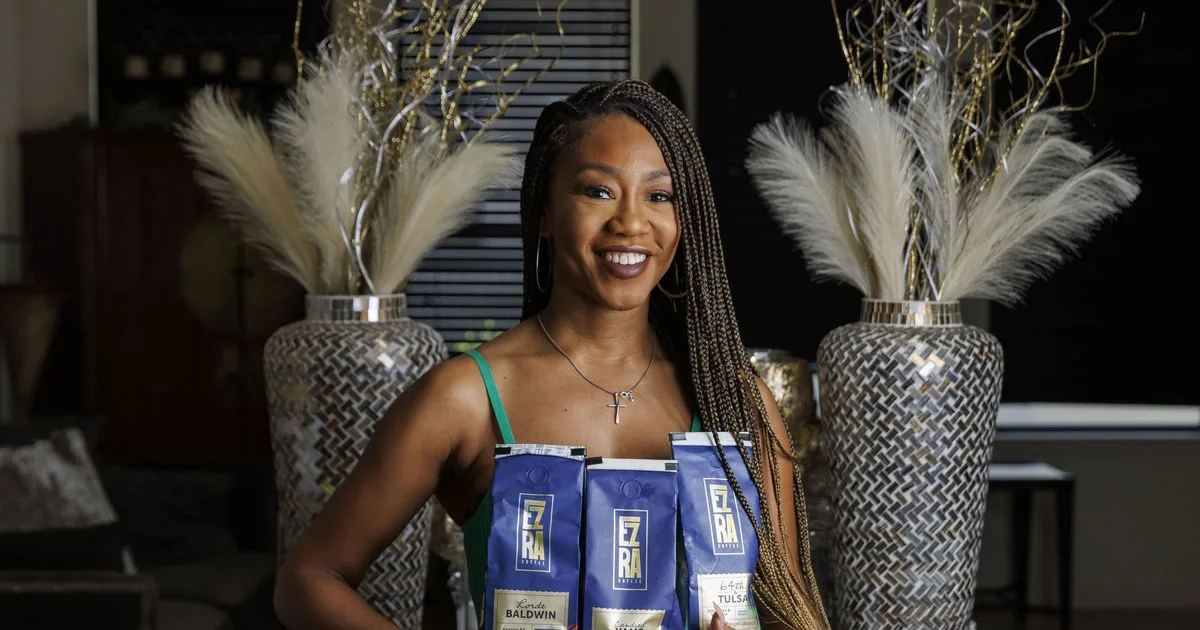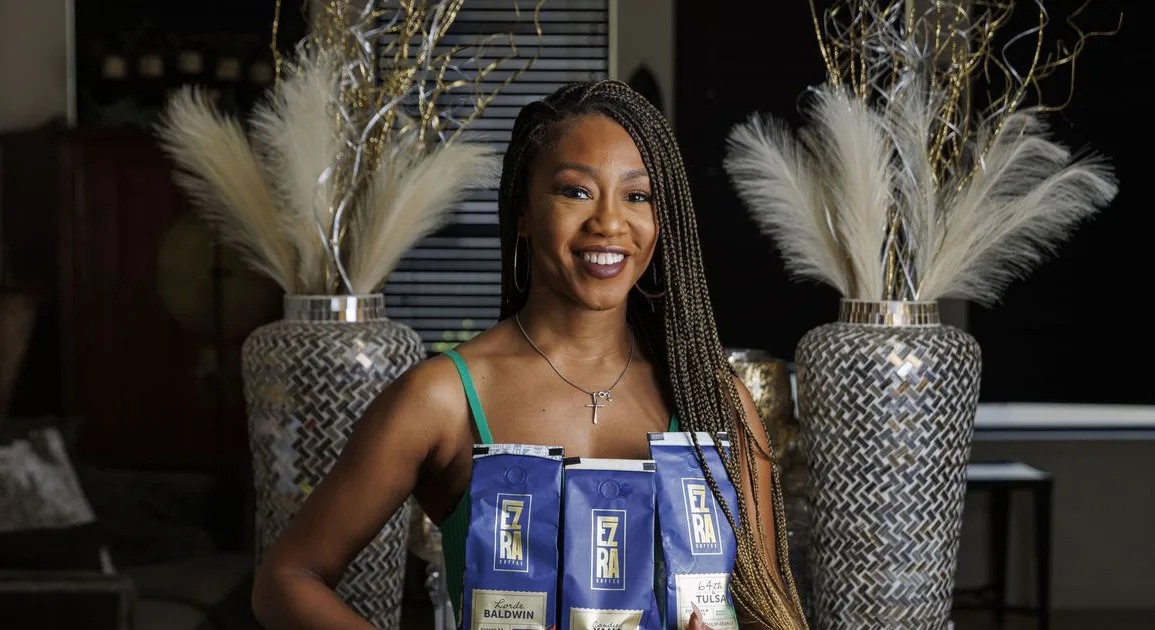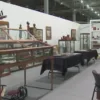
Jessica Taylor pours unroasted coffee beans into a hot cast iron skillet in her East Dallas apartment. With a spatula in hand, she pushes the pale beans across the pan. She laughs. Talking while roasting has proven to be a tricky task.
“I was burning up stuff left and right,” Taylor said.
But starting fires in her previous home in Little Elm while roasting coffee beans isn’t something she worries about anymore.
Over the last two years, the entrepreneur has scaled the coffee company she started at home into a specialty whole bean and ground coffee line sold in more than 40 H-E-B stores and on Target.com. To fill growing orders for her boutique brand, Ezra Coffee, Taylor began working with an industrial roaster in Grand Prairie in June 2020.
“We thank God for him every day,” Taylor said. He’s helped Taylor get a consistent roast to mass-produce her coffee beans.
But it’s her watchful eye at the kitchen stove and family-driven purpose that jump-started her small coffee company. Outside of the team at the warehouse, Taylor is Ezra Coffee’s only full-time employee alongside a few contractors. “It probably seems hard, but it’s really not,” Taylor said about roasting coffee at home. “It’s like flipping an egg.”
About the coffee
While Ezra Coffee has medium and dark roasts suited for people who love black coffee, the brand began by finding coffee options her sister would like.
“This is a girl that wants to put milk in everything,” Taylor said. “She gets cornbread and puts the cornbread in the milk.”
Taylor, 38, started coming up with flavored coffees as her sister’s eczema flares worsened and she had to cut dairy and nuts from her diet. Creamers and sweet nutty syrups were the vehicles for her sister drinking coffee. So they tried liquor. It led to “Le Grand Duc 1928,” or Ezra’s spirit-infused blend that has notes of apricot and caramel.
Like each of the names of roasts and flavored coffee grounds, Le Grand Duc remembers key figures of Black culture in the U.S. These histories are printed on the bag’s packaging, which also features Ghanaian Adinkra symbols.
“I want to tell the stories of amazing Black people,” Taylor said. “And also keep our history alive, not Black history, our collective American history.”
The cognac coffee pays homage to Eugene Bullard, the first African-American combat pilot in World War I and owner of Le Grand Duc, a famous Parisian jazz club. Bullard reportedly introduced cognac to his well-known patrons, those like Louis Armstrong, Langston Hughes and Josephine Baker.
“I wanted us to continue to tell the stories of Blackness that were not rooted in slavery, but in some uplifting things,” Taylor said.
Ezra’s other coffee flavors include Toasted Southern Pecan and Candied Yams. Both Taylor and her sister’s favorite roast is 64th and Tulsa, a medium-dark roast named after Black Wall Street in the Greenwood District of Tulsa and the signing of the Civil Rights Act of 1964.
“It was progression through darkness,” Taylor said. “Which is why it’s our medium-dark roast.”
The two sisters from Atlanta had their first sip of coffee in Arkansas during a summer stay with their grandparents. Taylor, 9 at the time, sat at the round kitchen table topped with a glass jar of sugar cubes. Despite her grandmother saying no, her grandfather gave her the OK to sneak a little coffee.
“You can probably smell these,” Taylor said, as the beans on her stovetop brown and fill the apartment with its earthy aroma. Her spatula clinks against the cast iron, as she turns the beans with more attention.
Taylor’s faith is central to her life, and her company. It’s why the company is named Ezra, or Hebrew for “He who serves.”
“I thank God every day,” Taylor said. “I pray for my business every day.”
Building out Ezra Coffee
She knew she should consider upgrading from her four-burner cooktop to a warehouse production after a blind taste test went well at her Martin Luther King Jr. party in January 2020. Several people asked where she got the coffee. When she admitted it was hers, that was the final push to convince her to launch her startup.
“If it sails, cool. If it doesn’t, fine,” she thought. When she put a few bags online on her website, Target sent her an email. She marked it as spam. It wasn’t until she was sent a follow-up that she realized it was a real offer. Before she knew it, she had a business, even before she had a business plan.
In the two years since Ezra Coffee started, Taylor has learned by doing. She’s made mistakes, like ordering 5,000 coffee bags with fraudulent barcodes, useless to sell in stores.
“I think those are important lessons you learn in business, the ones where there’s not a class, there’s not a mentor, no one could have taught you that,” Taylor said. “You have to go through it.”
Taylor graduated in May 2022 from Breakthrough, an entrepreneurial program from JPMorgan Chase & Co.’s Advancing Black Pathways. It provides Black and Latina women entrepreneurs with a deeper understanding of startup funding, marketing strategies and networking opportunities to scale their ventures.
It’s part of the bank’s commitment to close the racial wealth gap and provide resources to help small businesses scale.
Despite Black women accounting for about 7% of the total U.S. population and 13.9% of American women in 2020, they only owned 0.91% of all businesses and 4.23% of women-owned businesses, according to a May report by Brookings, a nonprofit public policy organization.
Each entrepreneur accepted into the program is paired with a mentor and receives a $5,000 grant.
“It’s been amazing to see what Jessica learned through Breakthrough Dallas and put into action to grow her business,” said Terri Thomas, Chase community manager in Dallas.
It was helpful cash. But to get Ezra going, Taylor had to make some lifestyle changes, like selling her Lexus with all the bells and whistles, and learning how to cook.
Taylor moved to Dallas six years ago. Since then, she’s become a local personality as a cast member on Oprah Winfrey Network’s reality dating show Ready to Love Dallas, which aired in July, and as the host of her new podcast, So OFFScript, where Taylor and guests talk about their businesses and behind the scenes details of Ready to Love.
Before starting Ezra, she spent more than a decade working in diversity, equity and inclusion at universities like Ohio State and Purdue and in corporate settings like Toyota North America.
Her work in higher education led her to start Ezra Coffee’s scholarship program, which awards students pursuing four-year degrees up to $1,000 for emergency funding. “There’s typically no funding available for those kinds of instances,” Taylor said. So far, the company has awarded scholarships to Southern, Howard and Alabama State universities.
In navigating her new venture, she’s often felt in over her head. But it’s a space she wants to be in.
“If you’re not, then you’re not dreaming big enough,” Taylor said. “You’re not praying hard enough. You’re not asking God for the biggest if you’re comfortable.”



